No Yellow Jerseys Here
The thighs may be as thick, the spandex just as tight, the stench of grease and melting energy bars just as rank—but the 2005 Cycle Messenger World Championships is a far cry from the Tour de France. A story and photo gallery from the race.
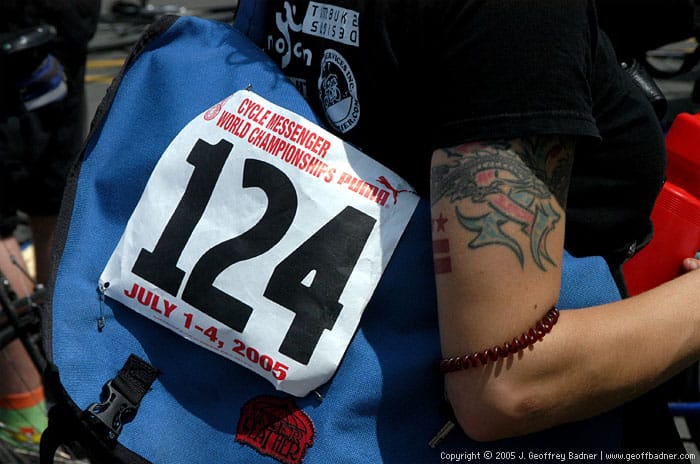
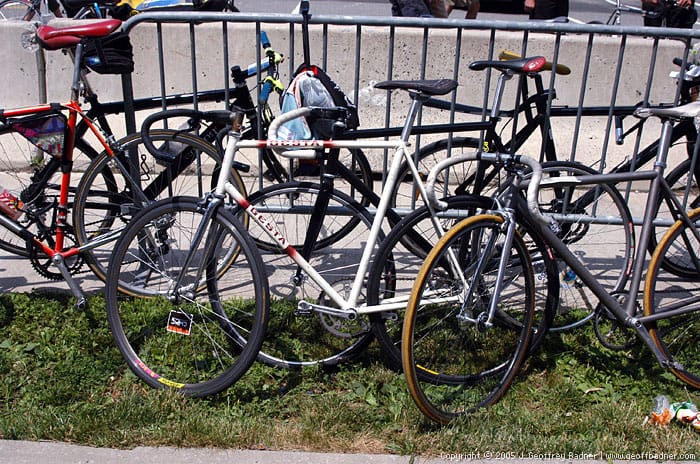
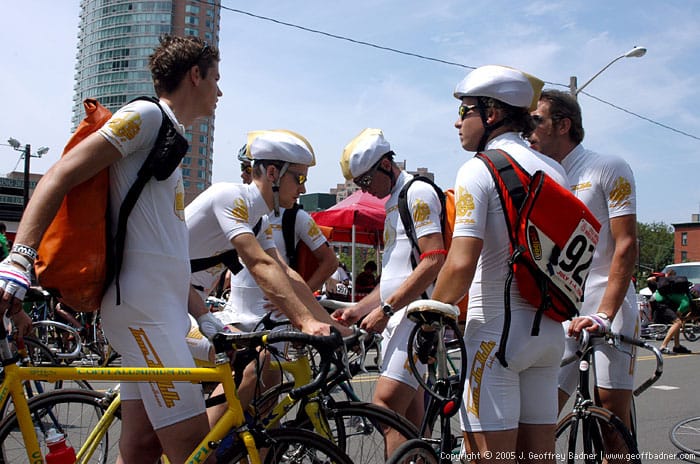
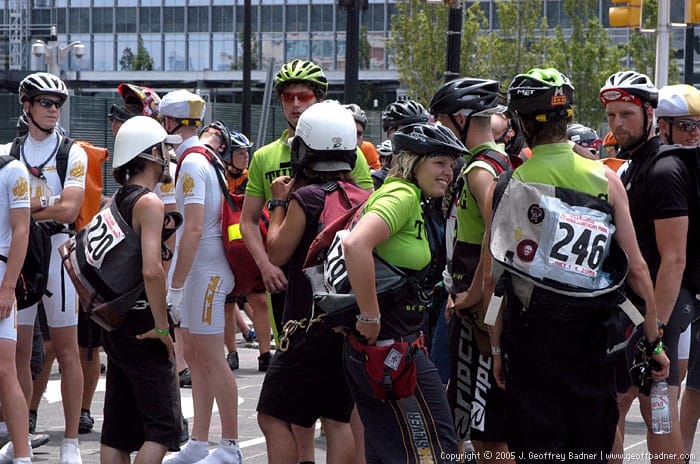
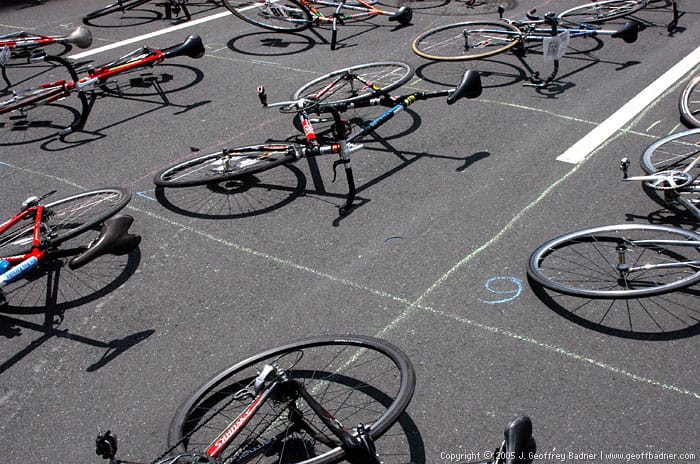
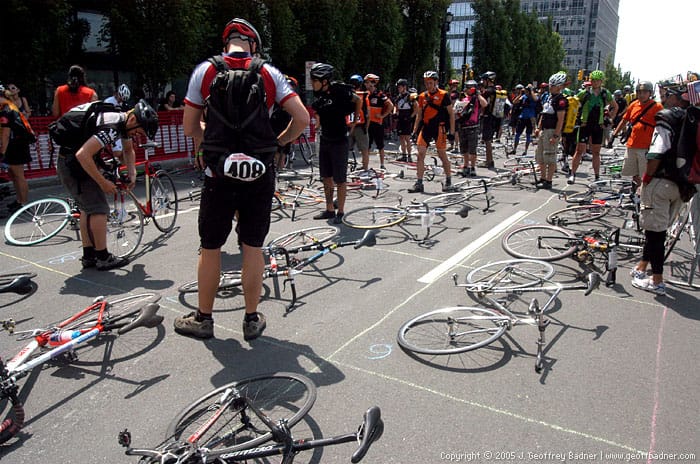
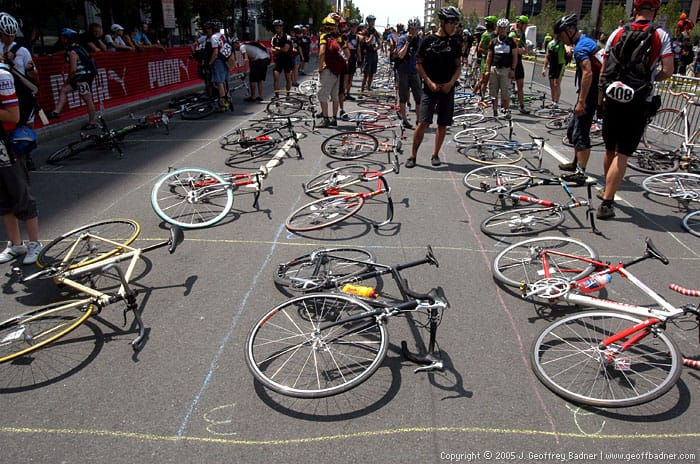
Geoffrey Badner for The Morning News
Outside a Polish nightclub in Greenpoint, Brooklyn, black-clad bouncers are frisking the well-tattooed, wildly coifed, shoulder-bag-lugging gladiators of the 2005 Cycle Messenger World Championships. The line extends almost to the next block, where hundreds of lightweight, thousand-dollar fixed-gear bicycles—Bianchis, Cannondales, custom-frame bikes, many with theft-attracting decals scratched off—are locked to a construction site’s scaffolding by chains as thick as boas. Hundreds of bike messengers from all over the world are in New York City for the weekend’s annual competition of speed, skills, and professional recklessness, but tonight most are here to drink the free beer (please do not drink and ride) and to exchange tall tales of unexpected car doors, scooter police shaken off, and bikes loved and lost.
It’s easy to tell who the American, if not New York City, bike messengers are. They look the part. They wear cargo shorts and dangle piercing wherever anatomically possible, sport numerous calf and arm tattoos—skeletal Virgin Marys, beanstalks, Medusas, Mercury’s wings on both ankles—and walk with a bit of street bravado, always ready to bang, boom, sprint into delirious Red Bulled jive. Many of the women messengers subscribe to full-blown bull/punk aesthetics—chains, cropped hair, the stride of a construction worker—but many also seem to have stepped out of a Suicide Girls calendar. In Europe and Asia, most bike messengers are cycling enthusiasts doing a job no more distinguished than a mailman or a plumber. With the fringe culture largely absent from bike messengers there, they are more like jocks than punks. The pretty-boy German bike messengers in the main dance hall are wearing team jerseys (printed with the motto: “Hard Cycling, Good Looking”) and matching waterproof, vinyl Ortlieb bags that resemble pizza delivery pouches. They are without visible tattoos and have clean, slick hair, looking very much like James Van Der Beek and Matt Damon clones in spandex tops. The Japanese have on choice selections from the latest urban-wear catalogue and are generally very, very polite.
What the messenger tribes, no matter their origin, have in common is their love of biking on city streets and a celebration of the risks and dangers of their line of work. The most popular emblem appears to be the skull and crossbones. You see it on messenger bags, permanently inked on triceps, on T-shirts, on bike frames. “We are the new pirates,” they seem to be saying. Glory in the seas is now glory on asphalt, and the menace of sharks and royal navies now come in the form of carelessly driven SUVs and cell-phone-focused jaywalkers.
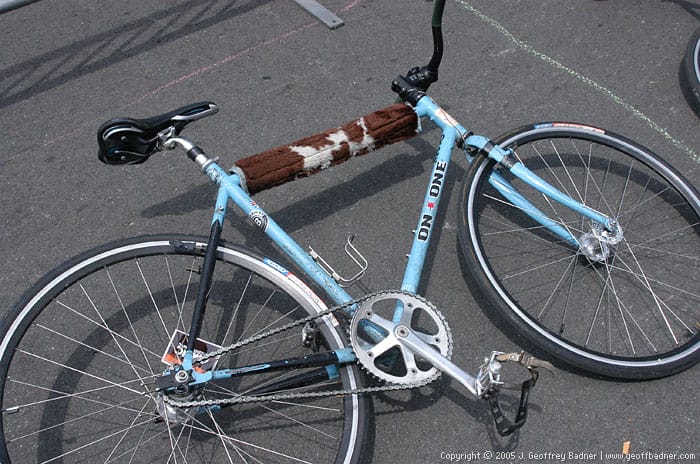
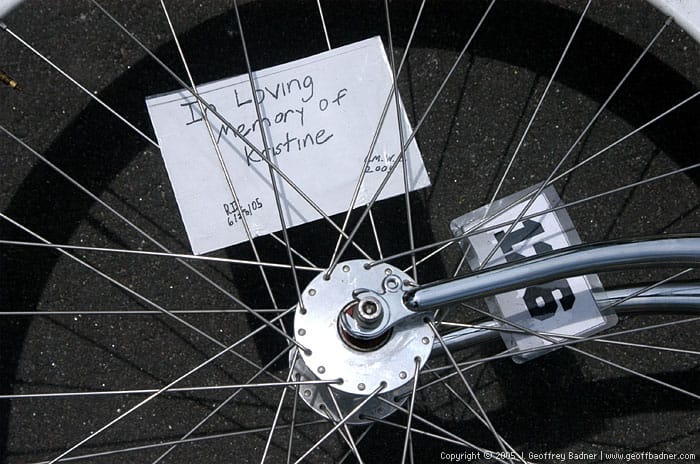
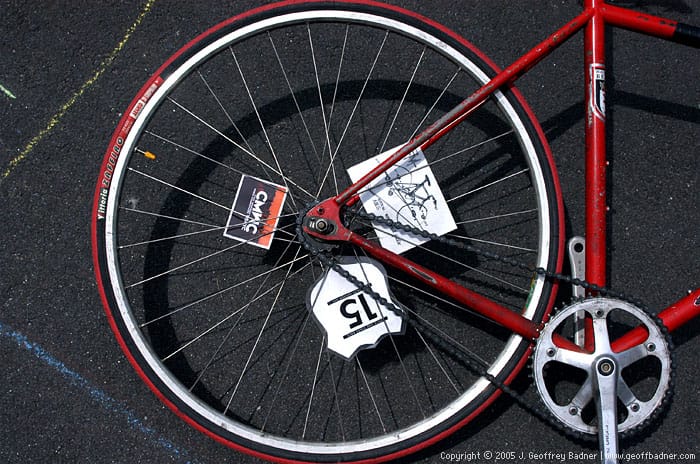
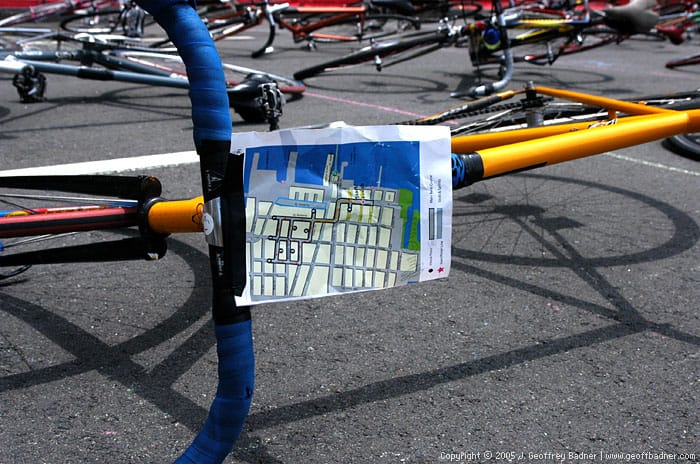
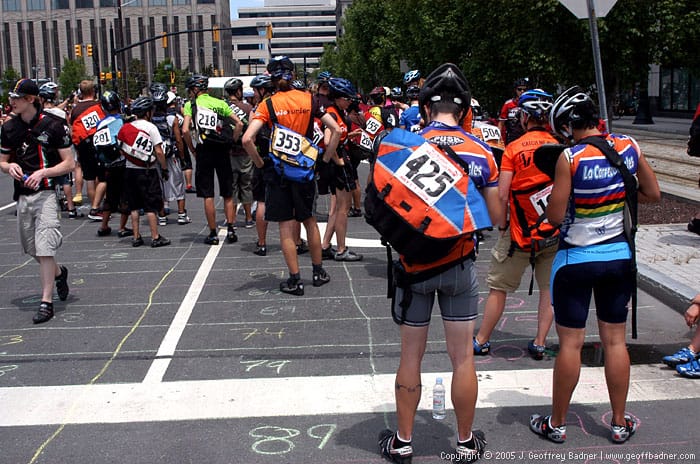
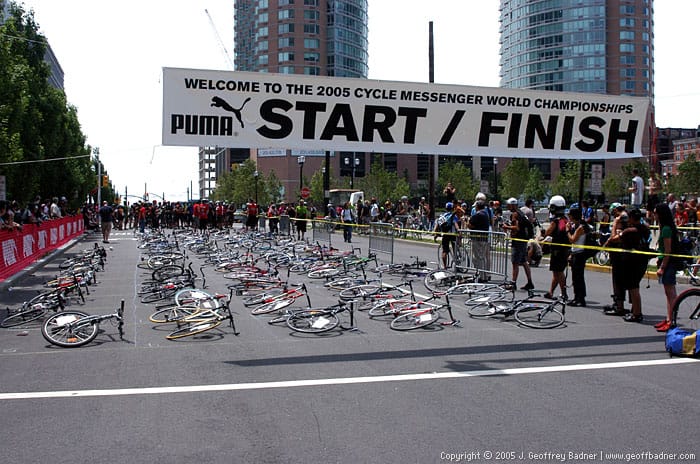
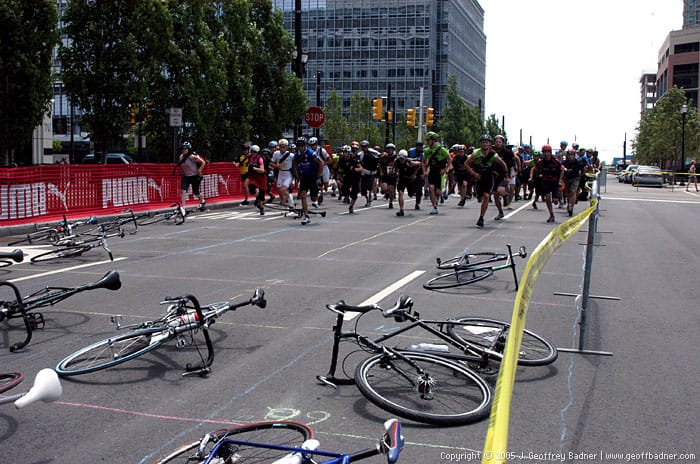
Geoffrey Badner for The Morning News
Bike messengers have been around since the 1890s, the golden age of bicycling, when the League of American Wheelmen attracted tens of thousands to its rallies. An 1893 article in the Atlanta Constitution announced the opening of a “new and novel enterprise” that would “open its doors and oil its bicycle… ready for the delivery of messages and small parcels,” and in the same year a man in Indiana began an agency that charged 15 cents a trip for bicycle deliveries. Starting in 1922, French couriers raced a little more than 140 pounds of cargo along designated routes in the now defunct Championnat des Triporteurs and paperboys competed in their own Critérium des Porteurs de Journaux. In New York City, considered by many to be the bike messenger capital of the world, boom time came in the Reagan ‘80s. As Wall Street brought new-money excess to new heights, businesses demanded speed, more speed, then even faster speed for its signed documents, plane tickets, complimentary front-row passes from Acme Corporation, and nameless parcels about which messengers were not to ask questions. The 1990s saw the introduction of the fax machine, and then the internet, both of which helped bring an end to those lucrative times. Many messenger shops closed. Pay rates halved and haven’t gone much up since. Messengers generally make between $3 and $7 a run, earning between $200-$400 a week. Despite the risks they take, many don’t have health insurance.
“The pro-cyclists don’t drink beer, smoke weed, but they don’t have the style. People can’t relate to them. The messenger kids can fucking ride, and they’re a lot more interesting to most people than zombie-looking, cyborg pro-racers.”
Unlike surfers, skateboarders, and other practitioners of sports now labeled with a gigantic, smeary capital X, bike messengers engage in skills not born from the foaming, breaking waves of the Pacific or the parking-lot terrain of suburban ennui. Bike messengers have always been tied to commerce. They perform applied athletics, careening, spinning, and crashing with the tremors of capitalism, but somehow managing to not wholly submit themselves to it. In fact, it’s capitalism that just might save bike messengers from extinction in a world where more and more physical objects are being transformed into kilobytes and transmitted to their destinations digitally.
Onstage, the goateed Latino MC is getting the crowd excited for the gold sprint finals. Four bikes sit on stationary hometrainers, basically platforms with rollers that spin to the wheels’ motion. The projected computer screen shows the displays for each bike’s time, distance, and speed along an imaginary, frictionless 500-meter course. This is a contest of pure leg strength, stamina, and will. The messengers are warming up, cycling casually to pump more blood to their legs. The DJ is spinning old hip-hop songs. Naughty by Nature cuts to Snoop Dogg. One of the messengers strips down to a full-body white spandex suit with gold-lettered logos featuring a knuckle ring that spells out “Smut,” the team’s name. Another guy takes off his shorts to reveal the black spandex underneath. “Let’s get it on!” the MC shouts into the mike. The messengers are in position. The first green light blinks on. Then the second. Then the final one. “Go!” The messengers immediately break into hard pedaling. Their grips are so strong they look like they are trying to bend their handlebars. Sweat is spraying off their foreheads. The bikes shake and rattle. The messengers’ faces turn red and tighten into alternations of teeth clenching and nostril flaring. Then the unexpected happens. The guy on the green bike pedals so hard that he snaps the bike’s front fork. He falls to the floor hard. He is not writhing in pain, but is lying there, looking stunned. People on the stage ask if he’s OK. He doesn’t nod. He’s staring at the bike, which also is lying on the floor. After a minute, he gets up, picks up the bike, and triumphantly raises it above his head with one arm. The crowd goes wild.
“This guy’s a fucking animal!” the MC screams.
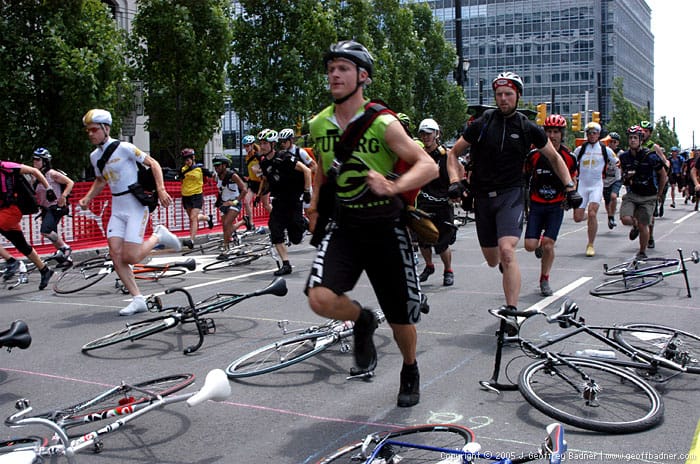
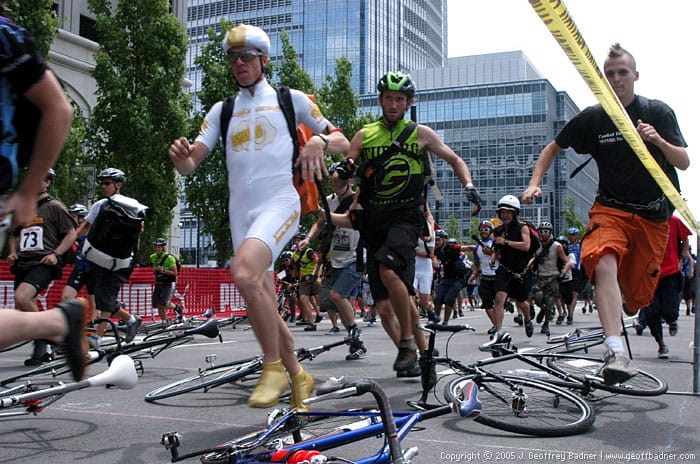
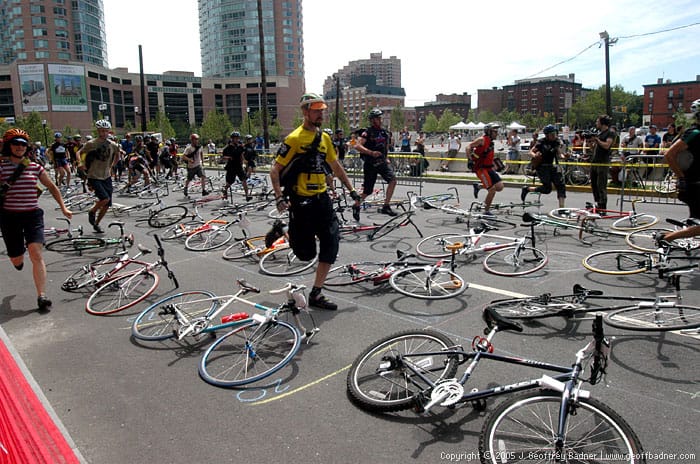
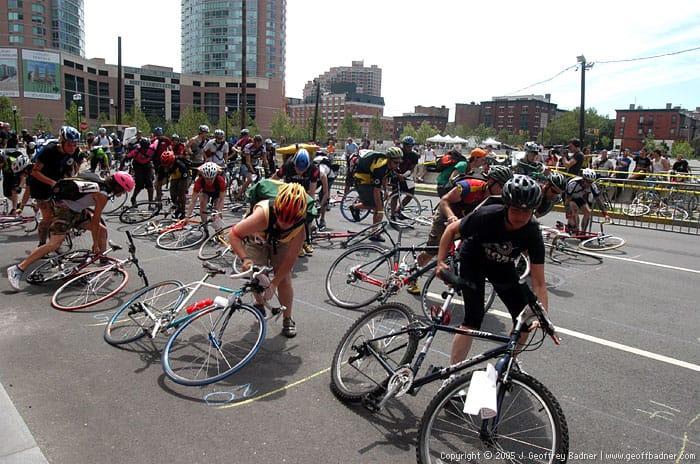
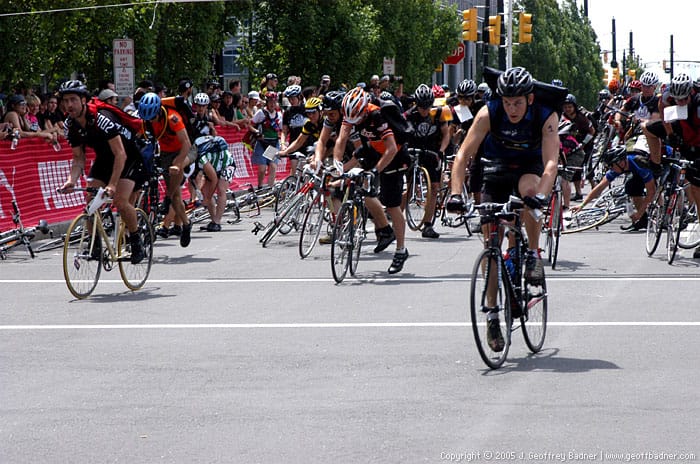
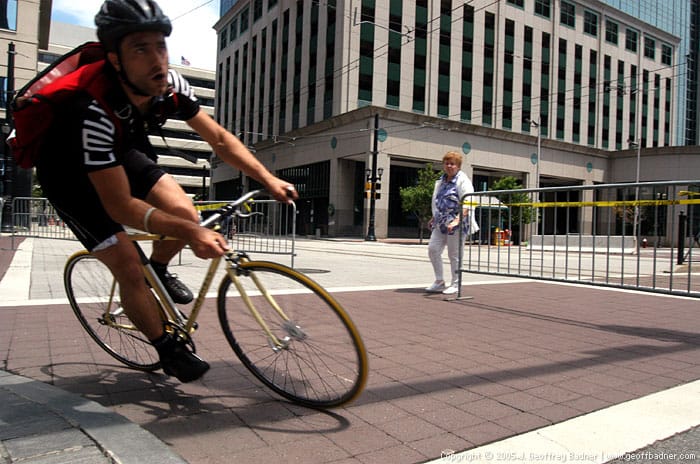
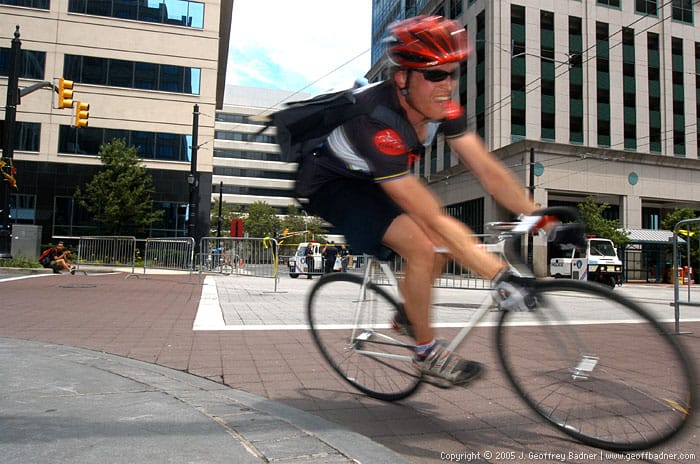
Geoffrey Badner for The Morning News
The untamable beast that roars in the hearts of bike messengers is a wanted, hunted animal, and in a garden off East Houston Street in Manhattan, Kevin “Squid” Bolger is giving a workshop on how to make the most out of that beast. If there is a public face to New York City bike messengers, then Squid’s is it. New stitches from a recent accident figure prominently on his mohawked head, but they are just another inconvenient footnote in his long career as a messenger in the city. In the early ‘90s, when he began working as a messenger, Squid saw how fragmented the community had been. The only time messengers got together was to pour liquor over a spot where one of their own had been killed. After seeing the potential for more community at the 1995 championships in Toronto, Squid began organizing events for messengers in the city. The Halloween Ride started. Messengers came for alleycats, unofficial full-speed races on live city streets. Remarkably, no one got seriously hurt throughout those early years, and Squid suspected that their luck wasn’t going to last forever. They were operating without a safety net. They needed insurance. They needed better equipment. They needed a way to fund teams that could showcase New York’s finest. They were still street urchins tossing in a handful of dollars out of their own small pockets. They wanted to be taken seriously, and for that they needed what they lacked the most: money.
Squid is passing handouts to the crowd in the garden. “I made these, like, this morning,” he says. Scrawled at the bottom of the handout: “You’ve got to love it! Think big. Perseverance.” Squid sits down in a rickety chair painted garnet red, and the crowd quiets down to listen.
“I was punk rock, anti-corporate, anti-police for years. Fuck permits. Fuck sponsors, keep it real in the streets. But you know, if you did it that way and someone gets fucked up, then you’re totally fucked.”
The first times he began soliciting money, Squid wasn’t asking for much more beyond the costs for shipping bikes, buying helmets and jerseys, and other vital expenses. His teams saved on travel money by hopping on freight trains. He asked messenger companies to pitch in some funds, but most were more interested in keeping their bike messengers on the streets and working. Squid had no experience in sales and marketing and couldn’t articulate exactly what he could give to the companies beyond the good karma of helping a few messengers compete. After messengers sped through a cleared-off route meant for pro-cyclists the night before the official race, some companies took notice and offered messengers sponsorship for their own relay races. Soon, Squid’s bike crew began to flirt with the means to an end for most pro-athletes not attached to city-based, brand name team franchises like the New York Yankees or the San Antonio Spurs. Marketing by association is big business. Squid realized that bike messengers could give gigantic, faceless corporate entities things they sorely lacked: image, edge, youth.
“The pro-cyclists don’t drink beer, smoke weed, but they don’t have the style. People can’t relate to them. The messenger kids can fucking ride, and they’re a lot more interesting to most people than zombie-looking, cyborg pro-racers.”
Squid became better organized and learned how to talk with selling points in mind. He could walk into a room full of Body Glove executives in suits-and-ties and convince them that his messenger team wasn’t going to “piss away” their sponsorship money at a Lower East Side dive bar. More than half the funds for this year’s world championships came from Puma. Squid is also a captain on Puma’s bike messenger cycling team.
“You have to convince them to invest in you. Here’s the fastest messenger kid in the world wearing your stuff.”
He looks down at his shoes. Pumas. “We’re billboards, pretty much.”
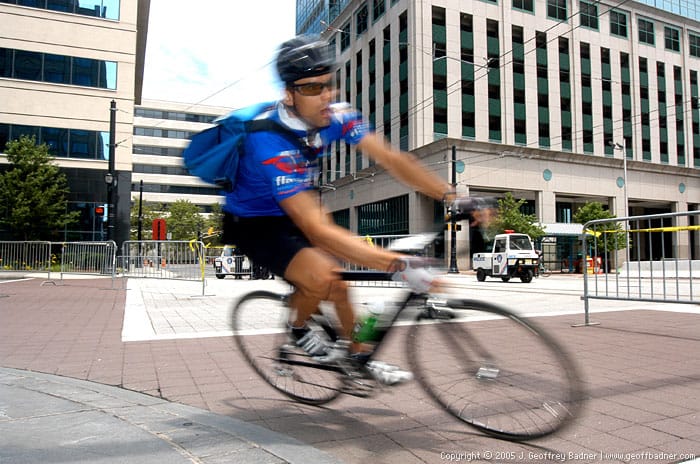
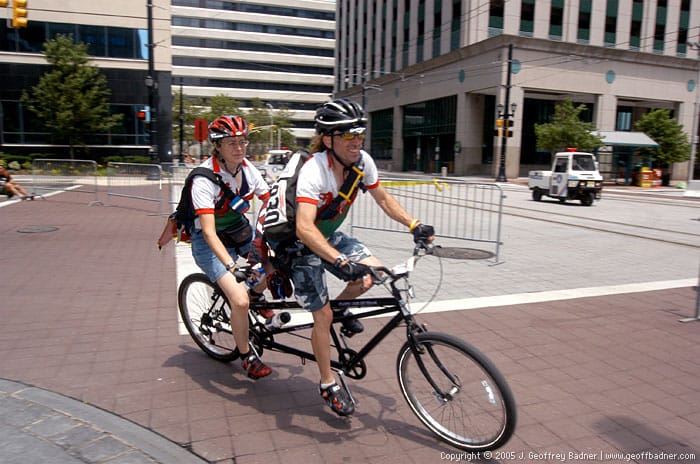
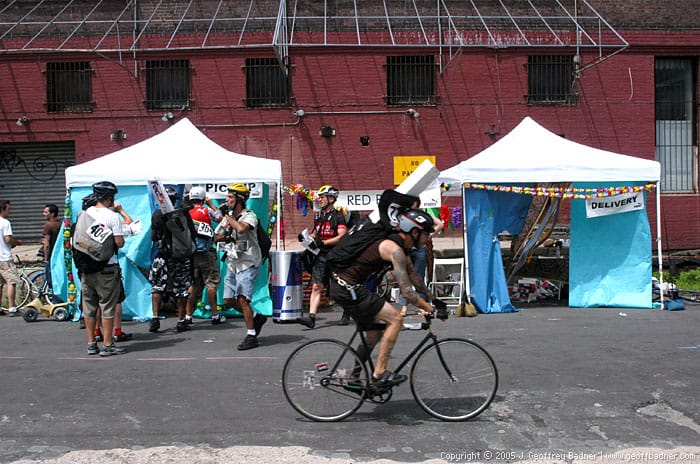
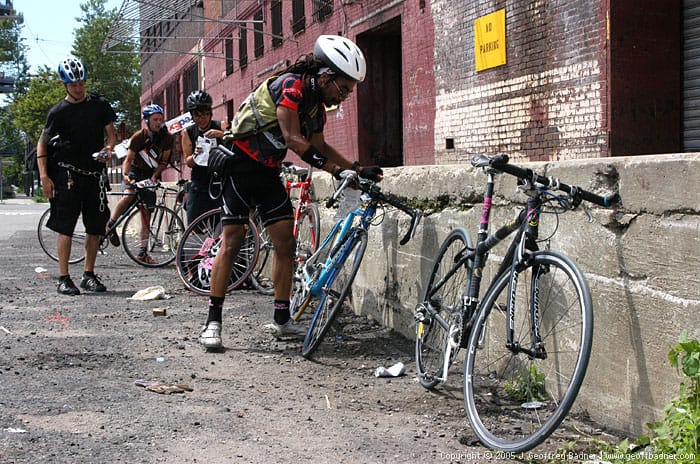
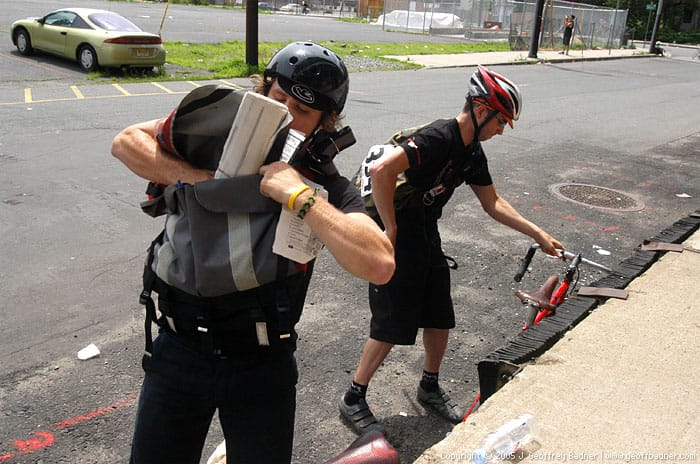
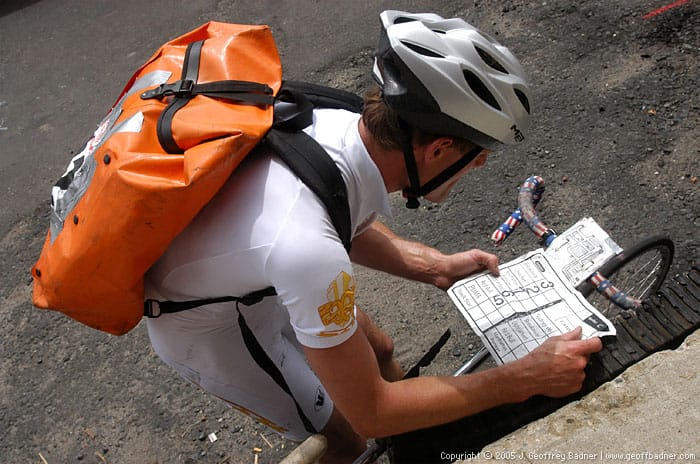
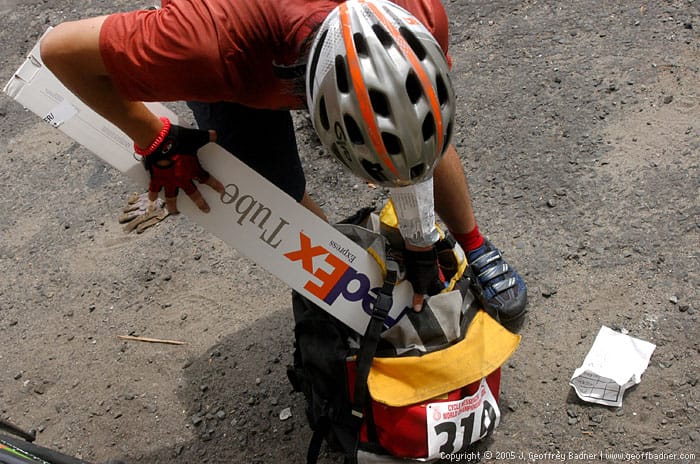
Geoffrey Badner for The Morning News
Hundreds of bike messengers have convened along a parking lot in downtown Jersey City. They are sprawled on the sidewalk, baking in the heat and waiting for the latest word about the race. An hour and a half after its scheduled late morning start, the main qualifying race isn’t close to starting. Squid is riding around the block, announcing through his megaphone, “Start, not soon!” The red Puma trailer parked nearby is attached to a menacing Hummer, but the messengers, usually ardent haters of high-tonnage, rib-cage-crushing SUVs, don’t seem to mind. They are emptying bottles of sponsored spring water into courtesy red sports bottles labeled with the distinctive feline logo. Some guys from Seattle are making last-minute adjustments to their bikes. “Where’s my motherfucking lube?” one asks. “I’m selling it for 10 cents a drop,” came the reply. They look a bit hung over. The spandex-covered European teams, on the other hand, look as if they didn’t stay up late last night. They are huddled in small circles and marking strategic routes on their city maps.
This is how everyday work becomes a sport.
A banner stretching across the two-lane street proclaims this intersection as the START/FINISH line. Steel barricades have sectioned off the streets into a closed route and two dozen policemen have been posted along the route to wave away traffic. The simulated city emerges. About six downtown blocks have been emptied and then outfitted with nine pickup and delivery checkpoints in between buildings. At the start of the main qualifying race, the messengers receive a manifesto that tells them the order of their pickups, with the delivery order to be then determined by their wits. They will be made to carry everything from textbook-sized shipping boxes to triangular cardboard boxes nearly two yards long. Tires will burst. Wipeouts will happen. Just as in their daily rounds, there will be confusion at the pickup and delivery areas. The qualifiers last about an hour, the finals a grueling five hours with multiple manifests in blazing heat. The race boils messenger racing down to its athletic, competitive essence. For once, inconvenient mobile obstructions are removed. Gone: yellow cabs, delivery trucks, buses, pedestrians, and debris. Intact: speed, stamina, and cool nerves. When the signal for the race start finally comes, about a hundred messengers break into a cheer as they run to the chalk-drawn squares where their bikes have been laid. They hop on and break into a sprint. Around the corner they go, not unlike jetfighters on a mission.
Shawn “Bega” Blumenfeld of D.C. Courier is watching his team work the course. He and his team members sport matching team jerseys and ride on multi-thousand dollar carbon-fiber Cannondales, looking more European, more pro-cyclist in style than the usual distressed T-shirt/cargo shorts get-up of their domestic brethrens.
“The job is a means to riding a bike, and riding a bike is a way of life,” waxes Bega as he lights up a cigarette.
He’s critiquing Laura Hopcroft, a teammate as well as a former messenger team world champion and North American sprint champion, as she dismantles her bike’s front wheel at the flat-fix checkpoint. She empties out the air from the tire, pulls out the inner tube, and then fills it up again with a manual mini-pump. Laura actually lives in Toronto, but went down to D.C. five weeks before the race for intensive training by Bega and Sheba Farrin, a two-time individual messenger world champion and a current pro-racer. This is how everyday work becomes a sport.
“Slowly, Laura. Take your time,” he advises in between cigarette puffs. “That’s it. Show them your valve.”
Laura finishes and then takes off for her next checkpoint. “Look at all the people still here,” he comments after another puff. “She has trained well.”
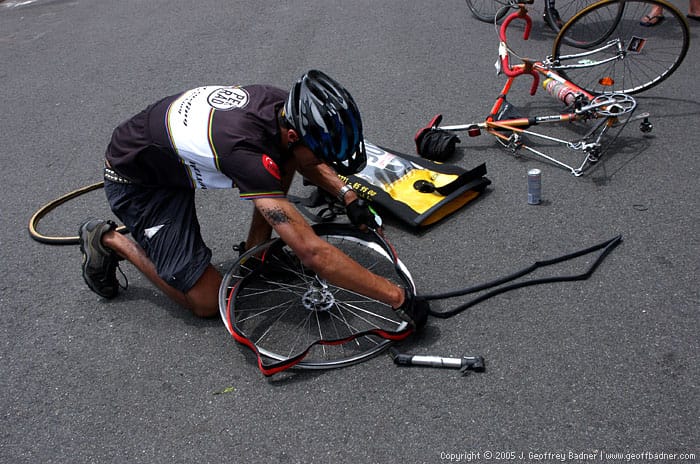
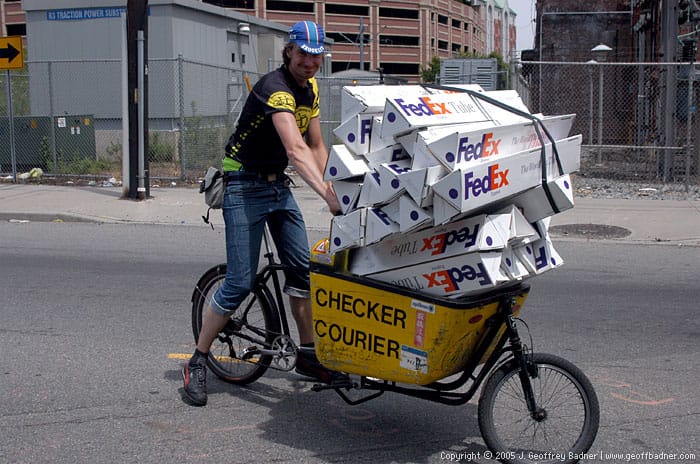
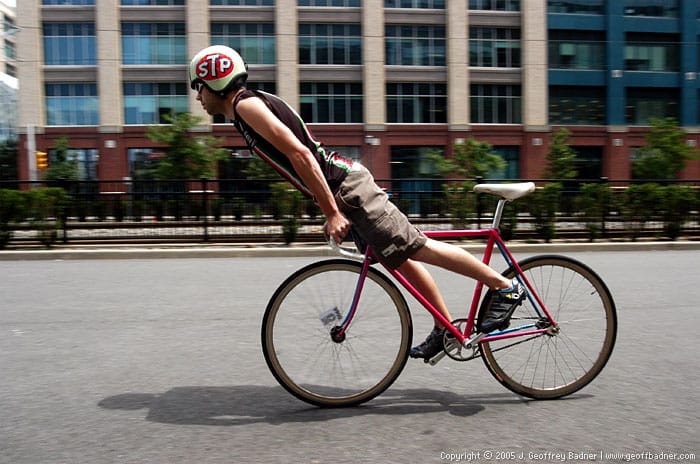
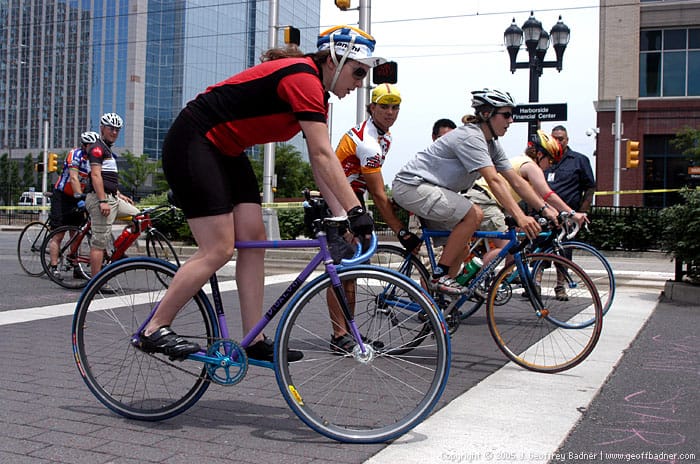
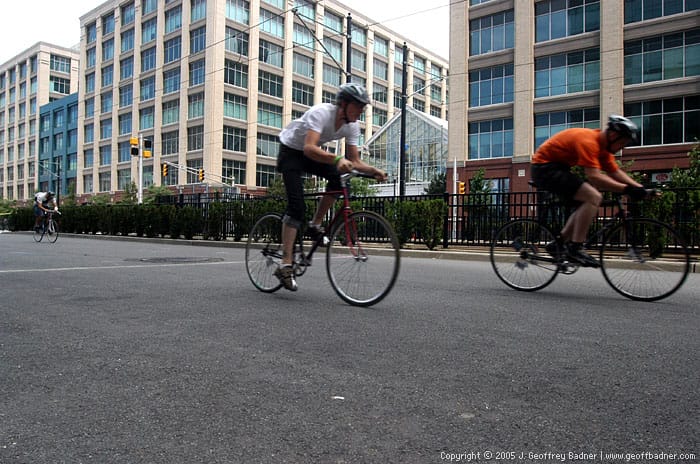
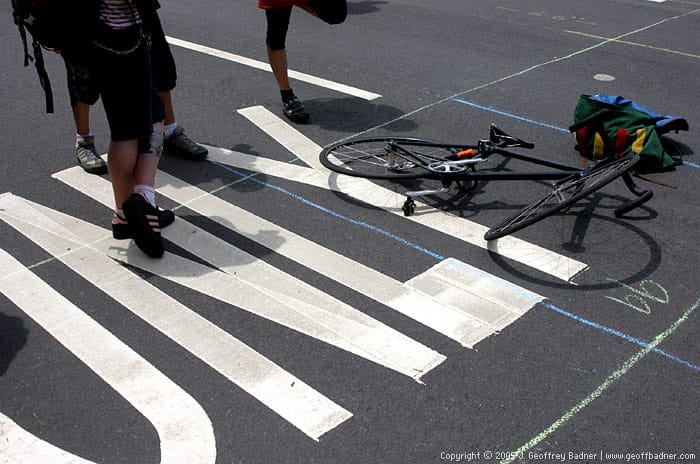
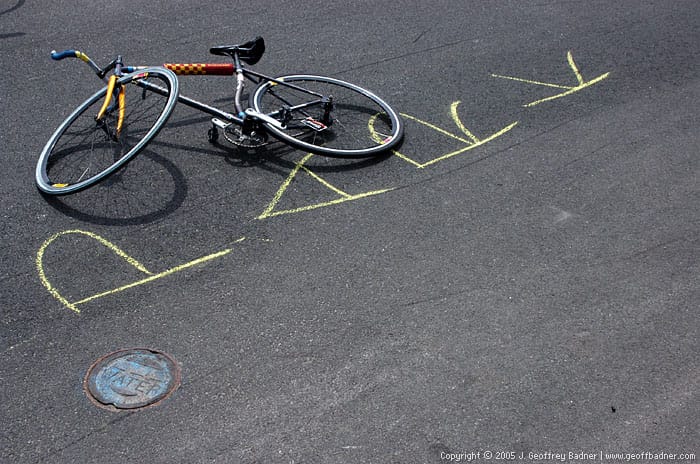
Geoffrey Badner for The Morning News
One by one they arrive in suburban Long Island, where there aren’t any skyscraper canyons as in Jersey City or Manhattan. Instead, planes en route to LaGuardia Airport leave long vapor trails in the clear sky overhead. It’s the final day of the championship events, and the party has moved to the Kissena Velodrome in Flushing, Queens. The 400-meter track rises up at an incline on both ends and is smoothly paved to maximize speed. This track was originally built for the 1964 Olympic cycling trials, as far away from the streets and as close to pro-racing as many of the messengers have ever gotten.
“I was born and raised in Queens, and I’ve never been here,” says Ranger, a New York City messenger. “Out in the city, you have to pre-calculate for cars, glass, and people. Here, you just concentrate on rotating.”
Ranger’s waiting for the race to begin with his friend Sequain, who went to an alleycat race the night before and nearly didn’t survive. As a matter of fact, he’s scanning the crowd for a bike his height that he can borrow.
“SUV. My bike was totally destroyed. It’s critically hospitalized. I shouldn’t be here right now.”
Sequain and Ranger will eventually race, but what skills and street smarts they’ve learned as messengers don’t totally translate to the race at hand. They lose in the qualifying rounds. As a matter of fact, in the early qualifying rounds, it’s fairly easy to predict who will win the races. The guys with the cargo shorts generally lose to the guys in the testicle-choking spandex who likely have more exposure to velodromes and pro-racing. When the races begin, they are going at the similar speeds. The first lap is slow as they take position and gauge each other. At some point, though, maneuver, strategy, and pro-cycling track experience come into play. The guy in the spandex knows when to make his bold move. He rides high on the incline and then swoops down to take a leading position. They’re sprinting as fast as they can, going somewhere between 20 and 30 miles an hour, but the guys in the cargo shorts eventually fall behind.
When the final men’s velodrome race arrives, the battle’s between Sneeko, Mr. Spandex from Europe, and Brooklyn’s homegrown Mr. Cargo Shorts. But this is no ordinary Mr. Cargo Shorts. This is Alfred Bobe Jr., who finished first among all track bikers participating in this year’s North American Cycle Courier Championships. Having previously raced on this very track against pro-cyclists, he knows he’s not going to lose. He doesn’t. In the last lap, he sneaks low down the incline and then climbs up and ahead of his competitor on his way to the finish line. He’s what messengers might call a fast motherfucker, and today he’s the fastest bike messenger motherfucker at the velodrome.
It’s probably not a stretch to say that Alfred Bobe Jr. and Squid or some emerging, younger version of them might one day not be the underdogs they are now. More and more bike messengers are being sponsored to compete against pro-cyclists. It has happened before. Nelson Vails, a Harlem messenger wearing a helmet painted with the New York City skyline, won the silver medal at the 1984 Olympics. When the messengers ride at the velodrome, they don’t look any different than pro-cyclists. They pedal as hard as their hard-partying lifestyle will let them. It will take adjustments and time, but the potential is there. The question will then be whether racing against pro-cyclists will prove to be for more reason than to make a point about their athleticism and sense of legitimacy. After all, they do more than sprint round and round a track.
In a world where formerly fringe sports such as skateboarding, surfing, and snowboarding have been packaged, marketed, and sold to the highest bidders aiming for the young consumers of the world, a search is on for the next untamed, broadcast-friendly athletes. Bike messengers are real contenders. Watching them compete in their own games, by their own rules, is like watching a high-speed obstacle-course game show featuring colorful, international characters who have no fear of death and dismemberment. Dispatcher races involve teamwork and military-like coordination, just like competitions in popular reality shows. It’s not inconceivable that future championships will be broadcast live on ESPN, with the same treatment as given to any other well-funded professional sport. More shoe and clothing contracts will be signed. Equipment makers will shower messengers with much-needed health insurance and cash. There might even be videogames, featuring wild, careening alleycats where graphic depictions of blood-spattering accidents bring sheer joy to the otherwise-numb existence of suburban teenagers and college students everywhere
“It’s a whole different genre,” says Ranger. “Lance Armstrong doesn’t live like us.”
He’s right. At the end of the championships, the bike messengers are holding up trophies made from rusty, welded-together bike parts. The contents of aftermath trash bags give evidence to their alternating diet of cheap beer and Red Bull. Outside the parking lot, a bar is placed across the top of two 40 oz. malt liquor bottles and bike messengers are pedaling up to jump over it.
